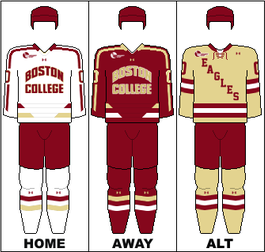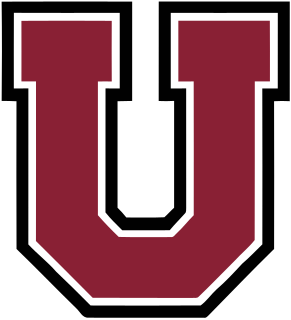Related Research Articles

The Hockey East Association, also known as Hockey East, is a college ice hockey conference which operates entirely in New England. It participates in the NCAA's Division I as a hockey-only conference.
The North Dakota Fighting Hawks men's ice hockey team (UND) is the college ice hockey team at the Grand Forks campus of the University of North Dakota. They are members of the National Collegiate Hockey Conference (NCHC) and compete in National Collegiate Athletic Association (NCAA) Division I ice hockey. North Dakota is widely regarded as a premier college hockey school and has one of the most storied programs in NCAA history. UND has made over 30 appearances in the NCAA tournament, appeared in the Frozen Four 22 times, and has won 8 NCAA Division I Championships. The program has also achieved 15 WCHA Regular Season Championships, 5 NCHC Regular Season Championships, and 12 Conference Tournament Championships. The school's former nickname was the Fighting Sioux, which had a lengthy and controversial tenure before ultimately being retired by the university in 2012 due to pressure from the NCAA. The official school nickname is now the Fighting Hawks, a name that was chosen by the university on November 18, 2015.

The Maine Black Bears men's ice hockey is a (NCAA) Division I college ice hockey program that represents the University of Maine. The Black Bears are a member of Hockey East. They play at the Harold Alfond Sports Arena commonly known as Alfond Arena in Orono, Maine.

The Boston University Terriers men’s ice hockey team is the college ice hockey team that represents Boston University. They played their first game in 1918 and have won five national championships, while making 22 appearances in the Frozen Four.

The Boston College Eagles are a Division I college hockey program that represent Boston College in Chestnut Hill, Massachusetts. The team has competed in Hockey East since 1984, having previously played in the ECAC. The Eagles have won five national championships, the most recent coming in 2012. Home games have been played at Kelley Rink at Conte Forum, named after coach John "Snooks" Kelley, since 1988, having previously played at McHugh Forum. The Eagles are coached by former Eagles and NHL defenseman Greg Brown, who recently took over the reins after the retirement of Jerry York.
Greg Cronin is an American professional ice hockey coach and current head coach of the Colorado Eagles of the AHL. Prior to joining the Eagles in 2018, Cronin held coaching positions with the New York Islanders and Toronto Maple Leafs of the NHL, the Bridgeport Sound Tigers of the AHL, and Colorado College, the University of Maine, and Northeastern University of the NCAA.

The New Hampshire Wildcats football program is the intercollegiate American football team for the University of New Hampshire located in the U.S. state of New Hampshire. The Wildcats compete in the NCAA Division I Football Championship Subdivision (FCS) and are members of the Colonial Athletic Association (CAA). The team plays its home games at the 11,000 seat Wildcat Stadium in Durham, New Hampshire, and are led by head coach Sean McDonnell, who returned to the program after missing the 2019 season due to a medical issue. Coach McDonnell recently announced his retirement.
Richard Umile is a former American men's ice hockey coach at the University of New Hampshire. Coaching the Wildcats from 1990 through the 2018 season, Umile led UNH to the most wins in school history.
Tim Whitehead is an American ice hockey coach at Kimball Union Academy, a boarding school in Meriden, New Hampshire. He was formerly the head coach at Maine for 12 years and Massachusetts-Lowell for 5.
Mike McShane is a college men's ice hockey coach. He ranks ninth all-time among NCAA men's ice hockey coaches with 653 wins in 30 years as a head coach. As the head coach at Norwich University since 1996, he has led his teams to the Frozen Four nine times and NCAA Division III national championships in 2000, 2003, 2010 and 2017.
Robert Donald Emery was a college men's ice hockey coach at the State University of New York at Plattsburgh. He played college hockey at Boston College from 1983 to 1986 and briefly played professional hockey with the Fredericton Express in New Brunswick and the Maine Mariners in Portland, Maine. He has been the head men's ice hockey coach at Plattsburgh State since the 1989-1990 season. With 465 career victories, he is the winningest hockey coach in Plattsburgh history and the 20th winningest coach in NCAA college history. His .742 career winning percentage ranks third all-time among college coaches with at least 300 wins.
Michael Souza often referred to as Mike Souza, is a former Italian-American professional ice hockey forward who currently is the head coach of the University of New Hampshire men's ice hockey team.

The 2013–14 Union Dutchmen ice hockey team represented Union College in the 2013–14 NCAA Division I men's ice hockey season. The Dutchmen were coached by Rick Bennett, who was in his third season as head coach. His assistant coaches were Joe Dumais, Jason Tapp, and John Ronan. The team captain was Mat Bodie and the assistant captains were Daniel Carr and Shayne Gostisbehere. The Dutchmen played their home games at Frank L. Messa Rink at Achilles Center and were members of the ECAC Hockey conference.
The Middlebury Panthers men's ice hockey team represents Middlebury College in men’s hockey and has done so since 1922. The Panthers currently play at the Division III and have won the most championships (8) of any D-III program. For a time the team did play along with top-level programs but when men's ice hockey divided into separate tiers in the mid-1960s Middlebury left the upper echelon.

The Boston University-Maine men's ice hockey rivalry is a college hockey rivalry between the Boston University Terriers and the Maine Black Bears in the Hockey East conference. The rivalry was born out of fierce on-ice competition between the two schools, especially in the 1990s and early 2000s, as the two schools were routinely at the top of the Hockey East standings and battled each other for conference supremacy.

The 1944 New Hampshire Wildcats football team represented the University of New Hampshire in the 1944 college football season. The Wildcats were led by first-year head coach Herbert Snow and completed the season with a record of 1–3. The team played its home games at Lewis Field in Durham, New Hampshire.
Terry Meagher (muh-HAR) is a Canadian retired ice hockey forward and coach who was twice named as the Division III National Coach of Year.
Wendall Francis Forbes was an American college coach for the baseball, football, golf and ice hockey teams at Middlebury College. He was the head coach men's ice hockey team for 22 years and was the Division III coach of the year in 1975.
Michael Ayers is an American ice hockey coach and former goaltender who was an All-American for New Hampshire.
The 2000–01 Boston College Eagles men's ice hockey season was the 79th season of play for the program. They represent Boston College in the 2000–01 NCAA Division I men's ice hockey season and for the 17th season in Hockey East. The Eagles were coached by Jerry York, in his 7th season, and played their home games at the Conte Forum.
References
- 1 2 Mike Lowe (November 29, 2006). "Coaching brothers meet again". Portland Press Herald.
- 1 2 Steve Solloway (February 4, 1996). "Big Brother Is Watching". Portland Press Herald (Portland, Maine).
- 1 2 3 4 "Bill Beaney profile". Middlebury College. Retrieved June 24, 2010.
- 1 2 "Dartmouth sizing up candidates". Boston Globe. March 12, 1997.
- ↑ Larry Mahoney (January 25, 1978). "Maine icemen host New England". Bangor Daily News.
- 1 2 3 4 5 "Bill Beaney Year-by-Year Record". USCHO. Archived from the original on May 23, 2008. Retrieved June 23, 2010.
- ↑ Carleton Laird (November 28, 2006). "Beaney gospel showing way to promised land". Rutland Herald.
- 1 2 3 "MIKE McSHANE of NORWICH UNIVERSITY IS NAMED AHCA MEN'S DIVISION III COACH of the YEAR". American Hockey Coaches Association. March 24, 2010. Retrieved June 24, 2010.
- ↑ Jim Greenidge (October 29, 1997). "After 3 NCAA titles, Middlebury feels forthcoming". Boston Globe.
- ↑ William N. Wallace (March 25, 1998). "Middlebury Makes It Four Straight Titles". The New York Times.
- 1 2 Bob Duffy (March 21, 1999). "Panthers whoop it up after 5th straight title". Boston Globe.
- ↑ "Beaney to step away". Rutland Herald (Vermont). July 3, 2002.
- 1 2 John Kekis (February 13, 2005). "A Miracle Remembered: Lack Placid preparing for the 25th-anniversary of historic hockey victory". Los Angeles Times.
- ↑ Bob Monahan (February 12, 1998). "Middlebury -- Fourth Coming? Panthers Are Pursuing a First". Boston Globe.
- 1 2 3 Carleton Laird (November 28, 2005). "Beaney gospel showing way to promised land". Rutland Herald.
- ↑ "Beaney earns 500th victory". Boston Globe. January 27, 2008.
- ↑ "Men's Hockey Coaching Records". USCHO.com. Retrieved October 3, 2018.